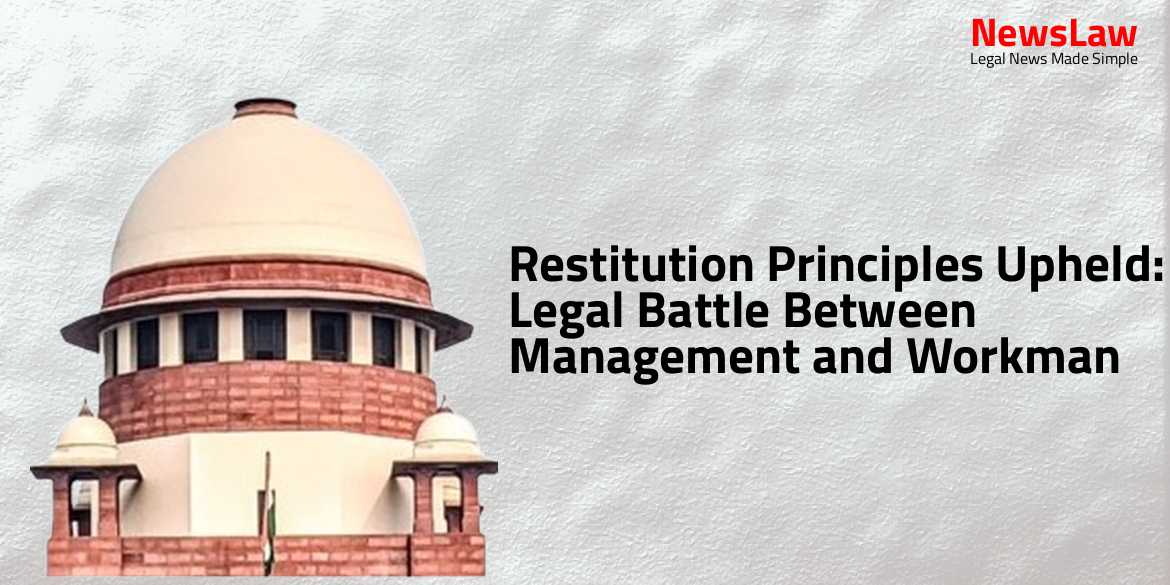Delve into a comprehensive legal analysis on retrenchment and re-employment in a recent court case. The court’s detailed examination of the circumstances surrounding the termination and subsequent offers of re-employment provides valuable insights into the rights and obligations of both employers and employees in such situations.
Facts
- Employees re-joined services on 16.03.2007 after a short strike.
- Appellant retrenched all fifty-five employees on 22.03.2007 citing closure of business.
- Employees demanded reinstatement with back wages, disputing the closure claim.
- Appellant started offering re-employment on new terms on 13.09.2007.
- Industrial Tribunal declared the strike by employees between 23.01.2007 and 15.03.2007 as illegal in 2009.
- The Tribunal answered the reference in the affirmative by setting aside the termination of employees and directing reinstatement.
- Back wages were denied to eight employees who admitted to being gainfully employed post-retrenchment.
- Reinstatement of employees with 75% back wages and other consequential benefits was confirmed.
- Complete shutdown of the company’s transport business was not established, making the retrenchment of all drivers simultaneous and punitive in nature for their strike action.
- The High Court affirmed the Tribunal’s decision, stating it was well-founded on evidence and in accordance with the law.
- Re-employment offers were considered immaterial as they required the employees to accept new positions, disregarding their prior service.
- The termination orders were set aside, and the workmen were directed to be reinstated with continuity of service and 75% back wages, except for the eight employees engaged in gainful employment post-retrenchment.
Also Read: Presumption of Genuine Endorsements in Cheque Case
Arguments
- Appellant did not effectuate any closure, but was re-organising its business by temporarily shutting down their transport activities.
- Challenging the finding regarding the offer of re-employment being illegal by arguing compliance with Section 25H of the Act which grants preference to retrenched employees.
- Submission that the directions to pay 75% back wages are contrary to the principles laid down by the court.
- Reference to cases such as M.L. Singla v. Punjab National Bank, Deepali Gundu Surwase v. Kranti Junior Adhyapak Mahavidyalaya (D. Ed.), Management of Regional Chief Engineer, Public Health and Engineering Department, Ranchi v. Their Workmen.
- Shri C.U. Singh argued that the employees admitted to working during the litigation period based on evidence.
- The Tribunal reinstated the employees with 75% back wages after considering oral and documentary evidence.
- The principle from Parry & Co. Ltd. v. P.C. Pal regarding reorganizing a business based on economic reasons was cited.
- The workmen were required to prove they were not gainfully employed after dismissal for legality of awarding 75% back wages.
Also Read: Medical Negligence and Compensation: A Landmark Decision
Analysis
- Supreme Court cannot interfere with the findings of fact by the Tribunal and upheld by the High Court under Article 136 of the Constitution of India.
- Tribunal and High Court correctly determined the case as virtually a closure.
- Evidence from workers and President of the Union supported the claim of remaining unemployed after termination.
- Decision in Deepali Gundu Surwase v. Kranti Junior Adhyapak Mahavidyalaya is considered relevant.
- Tribunal’s conclusion that retrenchment was imposed as retribution against the workmen for going on strike is supported by findings.
- 27 workers provided evidence in favor of payment of back wages.
- Findings support lack of bona fide in the Appellant’s offers of re-employment without continuity of service.
- Employer must provide cogent evidence to prove that the employee was gainfully employed elsewhere
- Orders of retrenchment being set aside entitles workmen to continuity of service and back wages
- Re-employment of retrenched workmen does not guarantee continuity of service, as established in previous court cases
- Principle applies only to cases of bona fide retrenchment
- Retrenchment followed by offer of re-employment on new terms and conditions is not considered bona fide
- The Tribunal found that the Appellant failed to provide any evidence that the workers were employed elsewhere and earning a livelihood.
- Based on the evidence, it was clear that the workers were dependent on the Appellant for their livelihood.
- The Tribunal upheld and affirmed the obligation of the Appellant in this matter.
Also Read: Remand of Writ Petition for Restoration and Decision on Merits
Decision
- Parties shall bear their own costs.
Case Title: ARMED FORCES EX OFFICERS MULTI SERVICES COOPERATIVE SOCIETY LTD. Vs. RASHTRIYA MAZDOOR SANGH (INTUC) (2022 INSC 821)
Case Number: C.A. No.-002393-002393 / 2022



